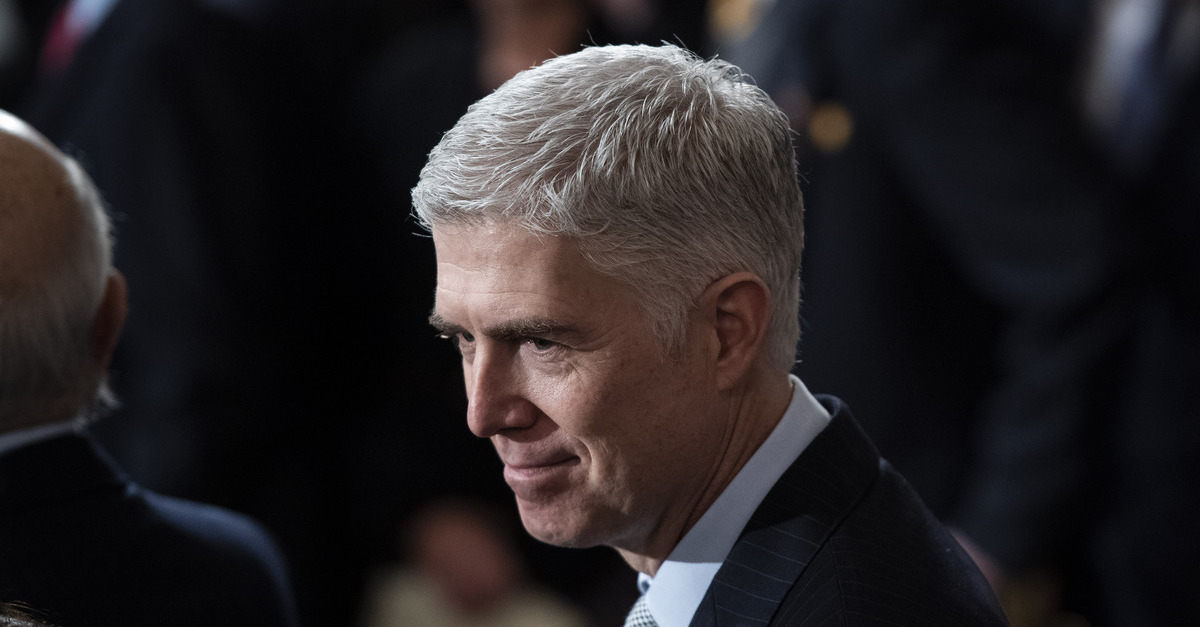
U.S. Supreme Court Justice Neil Gorsuch appears in a December 3, 2018 file photo.
Justice Neil Gorsuch penned a blistering dissent against a denial of a petition for writ of certiorari after the nation’s high court decided against hearing a case about criminal justice reform.
The facts of the case stylized as Khorrami v. Arizona are fairly straightforward: “Arizona convicted Ramin Khorrami of serious crimes before an 8-member jury.” the dissent explains. The defendant believes that juries of less than 12 people are unconstitutional under the 6th and Fourteenth Amendments. And he wants a new trial.
Gorsuch, in light of history, is inclined to grant him one; Justice Brett Kavanaugh would have also granted the petition but did not otherwise give any indication how he might have voted in the case.
“For almost all of this Nation’s history and centuries before that, the right to trial by jury for serious criminal offenses meant the right to a trial before 12 members of the community,” the dissent notes.
Gorsuch offers a brief history lesson to argue his point:
Start with this. We often say that “[t]he interpretation of the Constitution of the United States is necessarily influenced by the fact that its provisions are framed in the language of the English common law, and are to be read in the light of its history.” And while scholars may debate the precise moment when the common-law jury came to be fixed at 12 members, this much is certain: By the time of the Sixth Amendment’s adoption, the 12-person criminal jury was “an institution with a nearly four-hundred-year-old tradition in England.”
The justice’s ire is largely directed at the 1970 Supreme Court case of Williams v. Florida, wherein a majority of justices upheld a Florida law that allows six-member juries for criminal cases.
“Khorrami asks us to reconsider Williams,” the dissent says. “Regrettably, the Court today declines to take up that task. Williams was wrong the day it was decided, it remains wrong today, and it impairs both the integrity of the American criminal justice system and the liberties of those who come before our Nation’s courts.”
Gorsuch criticizes the Williams opinion for relying on a “bit of drafting history” by arguing that the Sixth Amendment’s right to a jury trial, if subject to such an inquiry, could easily point in the opposite direction. The Williams court says that if the drafters of the Constitution meant 12-person juries, they would have specified 12-person juries. Gorsuch notes that the language is vague and that probably the drafters felt the 12-person requirement was obvious because it was the “accustomed requisite” of the time.
“[P]lenty of evidence exists about the original public meaning of the Sixth Amendment,” the dissent argues, “and that evidence strongly indicates that the right to criminal trial by jury meant nothing less than a trial before 12 members of the community.”
In 2020, the court agreed with a criminal defendant that jury verdicts must be unanimous in Ramos v. Louisiana. Khorrami himself, as well as some amici, relied on that case as standing for the proposition that Williams must now be considered bad law.
Gorsuch doesn’t make that leap outright. But he cites heavily from Ramos in an effort to make the case against “judicial tinkering” with what he views as an “ancient tradition” and sacrosanct right:
[A]s we put the point more recently: “When the American people chose to enshrine [the jury trial] right in the Constitution, they weren’t suggesting fruitful topics for future cost-benefit analyses. They were seeking to ensure that their children’s children would enjoy the same hard-won liberty they enjoyed.” “As judges, it is not our role to reassess whether” the same jury-trial right that Americans enjoyed at the founding “is ‘important enough’ to retain. With humility, we must accept that th[e] right may serve purposes evading our current notice. We are entrusted to preserve and protect that liberty, not balance it away aided by no more than social statistics.”
The Williams court, Gorsuch disdainfully notes, relied on a “handful of studies” and cited them “to support its tepid assertion that 6-member panels would ‘probably’ operate as well as 12-member juries.” But that experiment, the dissent says, should come to an end.
“In 1970, this Court abandoned that ancient promise and enshrined in its place bad social science parading as law,” Gorsuch concludes. “That mistake continues to undermine the integrity of the Nation’s judicial proceedings and deny the American people a liberty their predecessors long and justly considered inviolable.”
[image via Jabin Botsford – Pool/Getty Images]
Have a tip we should know? [email protected]